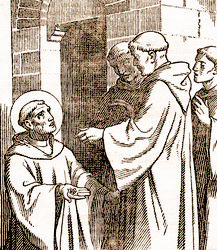Lives of the Saints
Our Models and Protectors
Spiritual Bouquet:
November 18

Saint Odon
or Eudes of Cluny
Benedictine, abbot of Cluny
(† 942)
On Christmas Eve of the year 877, a pious but childless Christian nobleman of Aquitaine implored Our Lord, by the fecundity of His Holy Mother and His Incarnation, to grant him a son. His prayer was heard; Odon was born, and his grateful father, in a prayer offered him — still an infant in his arms — to Saint Martin of Tours (?400) to be his spiritual son. Odon was later taught by a wise priest, then was placed in the court of the Count of Anjou and that of the Duke of Aquitaine. There he was influenced by the passions which reign in courts, and neglected his prayers to think only of games, hunting, and military pursuits. But God did not abandon him, and he was haunted in his dreams by the dangers of a disordered life. He prayed to the Blessed Virgin and begged Her one Christmas Eve to lead him on the narrow path of sanctity.
He was then sixteen years old, and the next day he fell ill with a sickness which increased and for three years kept him on the verge of death. When his father told him he had consecrated him to Saint Martin, Odon renewed this consecration and promised to enter into his service; suddenly then his headaches left him and he recovered from his illness.
He went to Tours to serve in the church of Saint Martin for a time. But when a hermitage was built nearby he retired there to devote himself to prayer and study, while continuing to visit the tomb of Saint Martin every night. He began to study the Scriptures and abandoned all pagan readings. Later he was inspired to enter the monastery of Baume in the diocese of Besançon, and there he received the habit from Saint Bernon, the abbot, in the year 909. He was charged with the instruction of novices and boarding students. When later he returned home on a visit to his parents, they were so touched by his words that despite their age they renounced the world and entered a monastery. When Odon returned to Baume he was ordained a priest.
When Saint Bernon, who had governed six monasteries, died, three of those were entrusted to Saint Odon; these were Cluny, newly founded in 910, Massay, and Deols. He resided in Cluny, of which he is often titled the Founder, because he organized and enlarged this new house. His reputation attracted a large number of vocations. His special care was for children; at that period the schools had taken refuge in the cathedrals and monasteries. He watched with gentleness over the habits, studies, and repose of these dear children. He personally taught them as well as the monks. The Rule of Saint Benedict, providing for the education of children as well as the formation of monks, was followed zealously. Many alms were given to the poor, without concern for the morrow. The charity of Cluny was so abundant that in one year food was distributed to more than seven thousand indigent persons.
Saint Odon visited Rome three times; there he reformed a monastery, and later in France he submitted several abbeys to the discipline of Cluny. These were organized into a federation under the sole abbot of Cluny, with great unity of statutes and regime. It was said that from Benevent to the Atlantic Ocean, the most important monasteries of Italy and Gaul rejoiced in being under his commandment. After celebrating the feast of Saint Martin at Tours in 942, Saint Odon fell ill; and having exhorted all the religious who had come there to see him and learn how to be regular in their observance, he blessed them and gave up his soul to God. He was buried at Tours in the church of Saint Julian.
Reflection: It needs only for a Catholic to show devotion to any Saint, says Father Newman, in order to receive special benefits from his intercession.
Les Petits Bollandistes: Vies des Saints, by Msgr. Paul Guérin (Bloud et Barral: Paris, 1882), Vol. 13